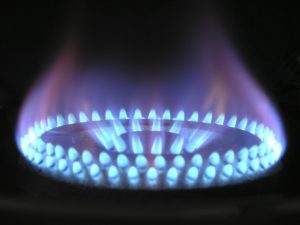
The number one source of house fires, according to the Red Cross, is from cooking
House fires are dangerous and sometimes deadly disasters that no one wants to think about. However, we do need to think about them so we can plan and try to prevent them. The number one source of house fires, according to the Red Cross, is from cooking. Read on for some tips to help you avoid kitchen fires and protect your home and family.
Clean And Prep Your Space
One of the most important things you can do to prevent a kitchen fire is to make sure your kitchen is clean and ready before you start to cook. Cooking grease can build up quickly when you’re cooking every day, and it is very flammable. Make sure you’re keeping your stove top, as well as the area around the stove and the exhaust hood, clean of grease. Make sure to also remove any other flammable materials, like towels or food wrappers, from the surfaces around the stove. Finally, don’t wear loose-fitting or billowy clothing when you cook. Long, flowing sleeves or dangling necklines could catch fire in an instant if they come into contact with the flame or hot element.
Cooking Rules
Another essential part of preventing kitchen fires is following basic cooking rules. First, always make sure you’re using the right cooking oil for the type of cooking you want to do. Next, if you’re doing high-heat cooking on the stove top or in the oven, such as sauteing, broiling, or frying, don’t leave the kitchen. This work needs your undivided attention. If you have to depart from the kitchen, turn the heat off. For other types of cooking, like baking, boiling, simmering, or roasting, you can leave the kitchen, but you should not leave your home. Next, make the kitchen, or at least three feet around the stove and oven and kid- and pet-free zone. Finally, once you’re finished cooking, turn off the oven. Not turning off the oven is a little thing that can lead to big fires. If you have trouble remembering to turn the oven off, turn the exhaust fan on whenever you’re cooking. The sound of the fan will remind you about the stove.
Fire Safety Basics
Finally, fire safety basics in your entire home could mean the difference between catching a small fire quickly, and it going entirely out of control. Make sure each floor of your house has a smoke detector. You should have one near the kitchen. You should also have a fire extinguisher in the kitchen, but make sure it is labeled type K. If you do have a small fire break out, know how to react. You should never try to put out a grease fire with water, instead smother it with a lid and let it cool completely.
Commercial and Residential Fire Prevention from Judd Fire Protection
If you want to ensure your home and business are safe throughout the year, trust Judd Fire Protection, LLC. We have over two decades of experience in designing, installing, inspecting, and repairing residential and commercial fire protection systems. We serve clients throughout Maryland, Pennsylvania, Washington, D.C., Virginia, and West Virginia. If you are interested in finding out more about our services and protecting your home and business, give us a call at 410-871-3480 or contact us online. For more fire safety tips, follow us on Facebook, Twitter, and Pinterest.
